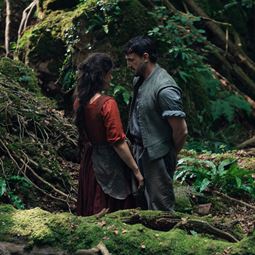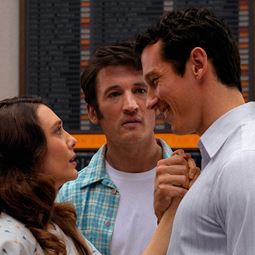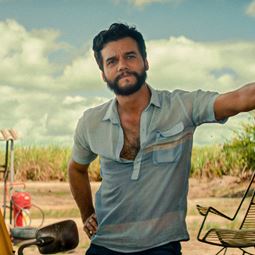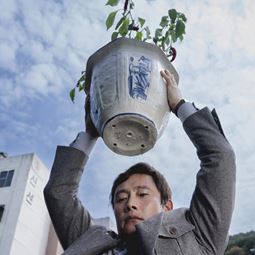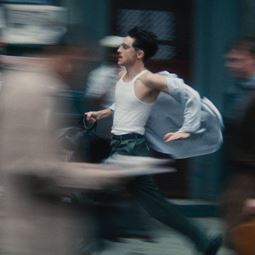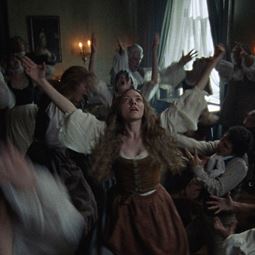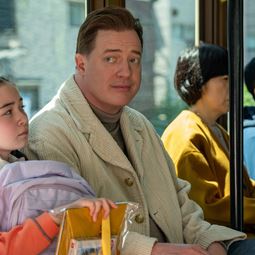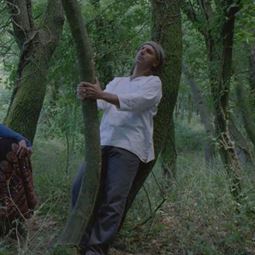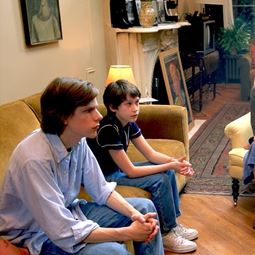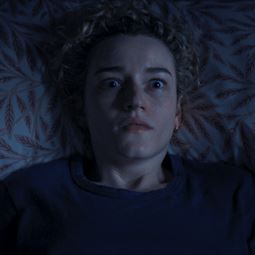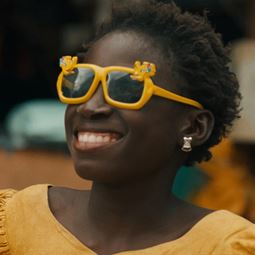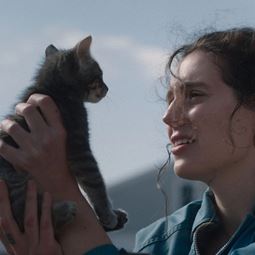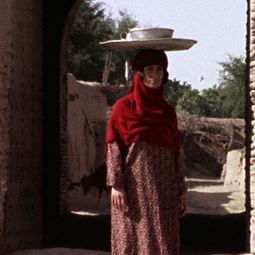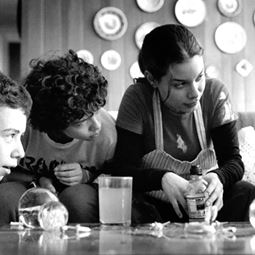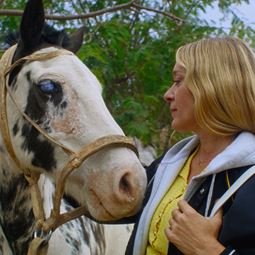BAM Film 2025
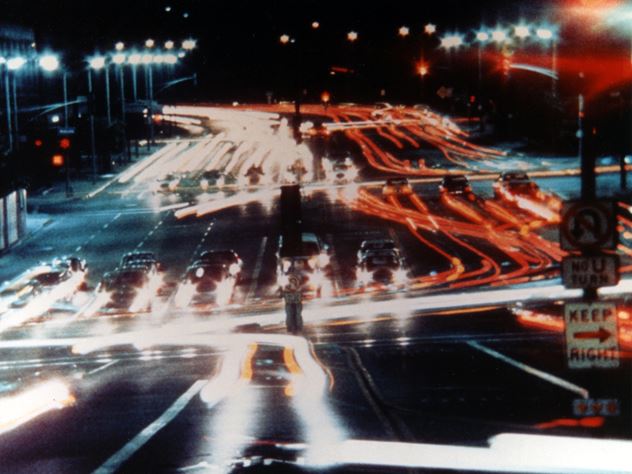
Jan 1—Dec 31, 2025
-
 Film
FilmOne Battle After Another
Now Playing
One Battle After Another
Now PlayingNEW RELEASEPaul Thomas Anderson (There Will Be Blood, Licorice Pizza) is back with a big, splashy thriller starring Leonardo DiCaprio, Sean Penn, Benicio del Toro, Teyana Taylor, and Regina Hall. -
 Film
FilmBugonia
Now Playing
Bugonia
Now PlayingNEW RELEASETwo conspiracy-obsessed young men kidnap a high-powered company CEO, convinced that she is an alien intent on destroying planet Earth, in a black-comedy thriller reuniting Yorgos Lanthimos and Emma Stone. -
 Film
FilmIt Was Just an Accident
Now Playing
It Was Just an Accident
Now PlayingNEW RELEASEAn unassuming mechanic is suddenly reminded of his time in an Iranian prison when he encounters a man he suspects to be his sadistic jailhouse captor, in a deeply felt moral thriller by Jafar Panâhi. -
 Film
FilmSentimental Value
Now Playing
Sentimental Value
Now PlayingNEW RELEASEJoachim Trier follows The Worst Person in the World (2021) with a deeply felt comedy-drama about legacy, art, and the performances that bind—and divide—families. -
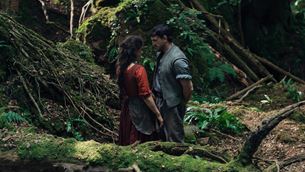 Film
FilmHamnet
Now Playing
Hamnet
Now PlayingNEW RELEASEPaul Mescal and Jessie Buckley star in Chloé Zhao’s adaptation of a novel about William Shakespeare, his free-spirited wife Agnes, and the tragedy that led to the creation of one of his greatest plays. -
 Film
FilmEternity
Now Playing
Eternity
Now PlayingNEW RELEASEIn an afterlife where souls must pick where to spend eternity, Joan (Elizabeth Olsen) must choose between the husband she spent her life with (Miles Teller) and the love she lost decades ago (Callum Turner). -
 Film
FilmThe Secret Agent
Now Playing
The Secret Agent
Now PlayingNEW RELEASEThe most awarded film at Cannes this year follows a former teacher and political dissident on the run during the waning years of Brazil’s military dictatorship. -
 Film
FilmNo Other Choice
Opens Dec 25
No Other Choice
Opens Dec 25NEW RELEASEHailed by critics as a masterpiece, Park Chan-wook’s (Oldboy, Decision to Leave) black-comedy thriller follows one man’s berserk search for a new job after he is abruptly laid off. -
 Film
FilmMarty Supreme
Opens Dec 24
Marty Supreme
Opens Dec 24NEW RELEASETimothée Chalamet gives “the defining performance of his still-burgeoning career” (Variety) as a ping-pong ace who goes to hell and back in pursuit of greatness in the latest offering from director Josh Safdie. -
 Film
FilmSong Sung Blue
Opens Dec 25
Song Sung Blue
Opens Dec 25NEW RELEASEHugh Jackman and Kate Hudson find love and follow their dreams belting out Neil Diamond hits in this based-on-a-true-story saga written and directed by Craig Brewer (Hustle & Flow, Dolemite Is My Name). -
 Film
FilmIs This Thing On?
Opens Dec 25
Is This Thing On?
Opens Dec 25NEW RELEASEBradley Cooper writes, directs, and co-stars in this understated comedy drama starring Will Arnett and Laura Dern as a middle-aged couple navigating divorce. -
 Film
FilmThe Testament of Ann Lee
Opens Jan 16
The Testament of Ann Lee
Opens Jan 16NEW RELEASEAcademy Award nominee Amanda Seyfried stars as Ann Lee, founder of the Shakers devotional sect, in writer-director Mona Fastvold’s portrait of an irrepressible leader who preached gender and social equality.
Past Screenings
-
 Film
FilmDie My Love
Jennifer Lawrence is fearless in Lynne Ramsay’s latest black-comedy psychological thriller.NEW RELEASE -
 Film
FilmRental Family
An American actor in Japan struggles to find purpose until an unusual gig helps him form bonds.NEW RELEASE -
 Film
FilmArchipelago Books x Theater of the Matters: These Encounters of Theirs
Non-professional Tuscan actors voice godly concerns in the final Straub-Huillet film.Wed, Dec 10, 2025 -
 Film
FilmThe Squid and the Whale - 20th Anniversary
Noah Baumbach celebrates the 20th anniversary of his triumphant coming-of-age feature.Thu, Dec 4, 2025 -
 FILM SERIES
FILM SERIESStarring Angela Bassett
Celebrate an actress who personifies the beauty and strength of Black women everywhere.Nov 21—Nov 25, 2025 -
 Film
FilmThe Mastermind
An amateur art thief thinks he has an airtight heist planned in Kelly Reichardt’s latest.NEW RELEASE -
 FILM SERIES
FILM SERIESCorporate Thrillers
This series of white-collar thrillers includes Wall Street, American Psycho, and more.Nov 14—Nov 20, 2025 -
 Film
FilmBad Hair
A boy in Caracas struggles to straighten his curly hair, making his mother suspicious.Thu, Nov 20, 2025 -
 Film
FilmGoing to Mars: The Nikki Giovanni Project
This award winning doc captures the vision and verve of poet-activist Nikki Giovanni.Wed, Nov 19, 2025 -
 FILM SERIES
FILM SERIESKisapmata + Batch ‘81
Two psychological dramas by legendary Filipino director Mike de Leon screen for one week.Nov 7—Nov 13, 2025 -
 FILM SERIES
FILM SERIESNewsreel Retrospective (1968—1972)
A groundbreaking collection of films document social movements of the late 60s and early 70s.Wed, Nov 12, 2025 -
 FILM SERIES
FILM SERIESFolklore & Fairytales
These unusual, beautiful, and haunting tales blend enchanting stories with cultural insights.Oct 31—Nov 6, 2025 -
 Film
FilmA New Life
Seeking a father she’d never met, a young woman discovers a half-sister she never knew about.Tue, Nov 4, 2025 -
 Film
FilmParis Awakens
A young woman oscillates between a father and his son, seeking independence and freedom.Tue, Nov 4, 2025 -
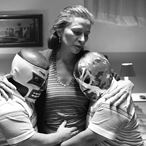 FILM SERIES
FILM SERIESWithout Limits: The Films of Arturo Ripstein
Discover the stylized, haunting films of Arturo Ripstein, a legend of Mexican cinema.Oct 24—Oct 30, 2025 -
 Film
FilmAfter the Hunt
Luca Guadagnino’s latest drama stars Julia Roberts, Ayo Edibiri, and Andrew Garfield.NEW RELEASE -
 Film
FilmFLUXX by Osadolor
This one-night-only program showcases Blackqueer creatives using Lo-Fi and D-I-Y aesthetics.Thu, Oct 23, 2025 -
 FILM SERIES
FILM SERIESWhere Do We Go Now?: Lebanese Women in Film
Discover groundbreaking films directed by Lebanese women during and after the Civil War.Oct 17—Oct 23, 2025 -
 Film
FilmReel Sisters Trailblazer Award Goes to Samantha Knowles
Reel Sisters and BAM honor Brooklyn filmmaker Samantha Knowles with a screening and interview.Wed, Oct 22, 2025 -
 FILM SERIES
FILM SERIESNewFest 37: New York LGBTQ+ Film Festival
NewFest celebrates the 37th anniversary of its annual New York LGBTQ+ Film Festival.Oct 10—Oct 16, 2025 -
 Film
FilmAnemone
Daniel Day-Lewis returns to the screen to star in his son Ronan’s directorial debut.NEW RELEASE -
 Film
FilmThe Smashing Machine
Dwayne “The Rock” Johnson and Emily Blunt star in Benny Safdie’s award-winning drama.NEW RELEASE -
 FILM SERIES
FILM SERIESNYFF63
The 63rd New York Film Festival brings exceptional new films from around the world to BAM.Oct 5—Oct 9, 2025 -
 FILM SERIES
FILM SERIESCaribbean Film Series
Another dynamic weekend of cinema from the Caribbean and its far-reaching diaspora.Oct 3—Oct 4, 2025 -
 FILM SERIES
FILM SERIESClassroom Rebels
Explore stories of students pushing back against the status quo from the late 50s up to now.Sep 26—Oct 2, 2025 -
 Film
FilmYi Yi
Edward Yang’s magnum opus follows a middle-class family in Taipei over the course of a year. -
 Film
FilmA Big Bold Beautiful Journey
Margot Robbie and Colin Farrell star in Kogonada’s (Columbus) sweeping cinematic adventure.NEW RELEASE -
 Film
FilmHighest 2 Lowest
A music mogul is caught in a ransom plot in Spike Lee’s reinterpretation of a Kurosawa thriller.NEW RELEASE -
 Film
FilmArteEast Presents The Orphanage
Kids at an orphanage in 80s Kabul navigate everyday challenges and seismic political shifts.Tue, Sep 30, 2025 -
 FILM SERIES
FILM SERIESClassic Caribbean Cultures
Well-known classics and undervalued gems take us on a journey through Caribbean cinema.Sep 19—Sep 25, 2025 -
 Film
FilmCaught Stealing
Aronofsky’s latest stars Austin Butler as a bartender who gets caught up in a dangerous web. -
 Film
FilmIxcanul: 10th anniversary
A teenage Kaqchikel Maya girl in Guatemala is caught between tradition and the modern world.Wed, Sep 24, 2025 -
 Film | Talks | Poetry
Film | Talks | PoetryDread Beat an Blood
Reggae icon Linton Kwesi Johnson recites his poetry, preceded by a potent 1979 documentary.Sat, Sep 20, 2025 -
 Film
FilmThe Mahabharata (8K)
Peter Brook’s three-hour distillation of the Hindu epic screens in a stunning 8K restoration.Thu, Sep 18, 2025 -
 FILM SERIES
FILM SERIESKino Polska
Catch the best in Polish cinema at our thrilling biannual film showcase.Sep 12—Sep 18, 2025 -
 Film
FilmSplitsville
A couple’s open marriage inspires chaos in this “riotous comedy of marital woes” (Deadline). -
 Film
FilmWeapons
Zach Cregger (Barbarian) directs one of the most anticipated horror films of the year.NEW RELEASE -
 FILM SERIES
FILM SERIESPaul Reubens Selects
A cinematic glimpse into the mind of the late Paul Reubens—better known as Pee-wee Herman.Sep 4—Sep 11, 2025 -
 FILM SERIES
FILM SERIESFirst As Tragedy, Then As Farce: Anti-Fascist Comedies
Filmmakers poke fun at authoritarianism by provoking laughter, thought and direct action.Aug 29—Sep 4, 2025 -
 FILM SERIES
FILM SERIESSummers of Change
Beat the heat with these films about characters surfing waves of summertime change.Aug 22—Aug 28, 2025 -
 Film
FilmEddington
Neighbor is pitted against neighbor in Ari Aster’s early-pandemic neo-Western black comedy.NEW RELEASE -
 Film
FilmSorry, Baby
Writer-director Eva Victor stars in a comedy-drama about a professor recovering from assault.NEW RELEASE -
 FILM SERIES
FILM SERIESVoyage in Time: The Films of Andrei Tarkovsky
Cool down with Tarkovsky’s complete features, including a rare documentary restored in 4K.Aug 15—Aug 21, 2025 -
 FILM SERIES
FILM SERIESRestored & Renewed
Our annual series of restorations features a variety of cinematic gems across five decades.Aug 8—Aug 14, 2025 -
 Film
FilmTogether
A couple who moved to the country has a nightmarish encounter with an unnatural force.NEW RELEASE -
 Film
FilmThe Sparrow in the Chimney
Past traumas threaten the relationship between two sisters in the latest film by Ramon Zücher.Aug 1—Aug 7, 2025 -
 Film
FilmOh, Hi!
Meet cute meets Misery in this charmingly odd dark comedy by writer-director Sophie Brooks.NEW RELEASE -
 FILM SERIES
FILM SERIESNYC 2000s
From towering hits to celebrated indies, take a look back at the Big Apple in the aughts.Jul 18—Jul 31, 2025 -
 Film
FilmFamiliar Touch
Sarah Friedland’s feature debut follows a woman adjusting to life in a memory care facility.Tue, Jul 29, 2025NEW RELEASE -
 Film
FilmMaterialists
A young, ambitious New York matchmaker is torn between her perfect match and imperfect ex.NEW RELEASE -
 FILM SERIES
FILM SERIESCity NDN’s: Urban Native America in 1960s—70s Film
Essential films and rarities examine a historical Native American migration to cities.Jul 25—Jul 27, 2025 -
 Film
FilmThe Phoenician Scheme
The new Wes Anderson ensemble caper involves a quirky tycoon targeted by would-be assassins.NEW RELEASE -
 Film
FilmAlfreda’s Cinema presents Sacred Transformations
Alfreda’s Cinema pulls together films about Black self determination, ritual, and care.Tue, Jul 22, 2025 -
 FILM SERIES
FILM SERIESContemporary Arab Cinema
These Arab films explore a region still grappling with its past and unsure of its future.Jul 9—Jul 17, 2025 -
 Film
Film28 Years Later
Danny Boyle and Alex Garland reunite for the long-awaited follow-up to their 2002 thriller.NEW RELEASE -
 FILM SERIES
FILM SERIESLet Them Cook: Cinema of the Rice Cooker
A humble appliance is the rightful star in dramas of the heart, the stomach, and the soul.Jul 4—Jul 8, 2025 -
 FILM SERIES
FILM SERIESRemakes, Ripoffs & Reinterpretations
A cinematic array of deferential remakes, inspired reinterpretations, and just plain ripoffs.Jun 27—Jul 3, 2025 -
 FILM SERIES
FILM SERIESErotic Nature: The Films of Pierre Creton & Vincent Barré
A retrospective of the quietly profound work of French farmer and filmmaker Pierre Creton and frequent collaborator Vincent Barré.Jun 20—Jun 26, 2025 -
 Film
Filmblack& loving presents Destiny2
This artist-led film program spotlights Black and queer cinema through the ages.Wed, Jun 25, 2025 -
 Film
FilmOctavia Butler: Between Worlds
Excerpts, episodes, and shorts reflect the brilliance of Octavia Butler.Sun, Jun 22, 2025 -
 Film
FilmWill
One of the first independent films ever to be directed by a Black woman screens for one week only.Jun 13—Jun 19, 2025 -
 Film
FilmSinners
Twin brothers trying to escape trouble find evil close to home in a Jim Crow-era thriller.NEW RELEASE -
 Film
FilmFriendship
Tim Robinson, Paul Rudd, and Kate Mara star in this hilariously demented anti-buddy comedy.NEW RELEASE -
 Film
FilmThe Ballad of Suzanne Césaire
An actress is haunted by voices as she attempts to inhabit the role of a surrealist writer.Jun 6—Jun 12, 2025 -
 Film
FilmThe Sealed Soil
A 4K restoration of Marva Nabili’s long-underseen masterpiece screens for one week only.May 30—Jun 5, 2025 -
 Film
FilmMUBI Notebook Presents: Double-Blind
MUBI Notebook presents a screening of Sophie Calle and Greg Shephard’s personal road movie.Wed, Jun 4, 2025 -
 Film
FilmPavements
Alex Ross Perry’s sorta-documentary about indie-rock band Pavement is absurdist yet loving.NEW RELEASE -
 FILM SERIES
FILM SERIESFilmAfrica 2025
FilmAfrica screens over 30 contemporary and classic films celebrating history and potential.May 23—May 29, 2025 -
 FILM SERIES
FILM SERIESCinema Tropical Presents Three Iconic Latin American Films
Celebrate the resurgence of Latin American cinema with three landmark films.March—May 2025 -
 Film
FilmDuck Season (Temporada de patos)
Teens bored at home have their plans interrupted in this portrait of enduring friendship.Thu, May 22, 2025 -
 Film
FilmGoing Down
Four suburban friends have an unforgettable night out in this Australian indie landmark.May 9—May 22, 2025 -
 FILM SERIES
FILM SERIESMalcolm X at 100, The Moving Image and Malcolm X
To mark his centennial, Alfreda’s Cinema presents a film festival honoring Malcolm X.May 17—May 19, 2025 -
 Film
FilmVulcanizadora
Two friends follow through on a disturbing pact in the latest film by Joel Potrykus.NEW RELEASE -
 Film
FilmMagic Farm
A misguided American documentary crew ends up in the wrong town in rural Argentina.NEW RELEASE -
 Film
FilmThe Shrouds
A techno-entrepreneur discovers an eerie conspiracy in a provocative new David Cronenberg film.NEW RELEASE -
 FILM SERIES
FILM SERIESWuhan, Different Every Day
Get to know Wuhan through a diverse lineup of features and documentaries.May 2—May 8, 2025 -
 Film
FilmThe Legend of Ochi
A shy farm girl embarks on a quest to rescue a mysterious wounded creature.NEW RELEASE -
 FILM SERIES
FILM SERIESPrismatic Ground
This annual festival of experimental film screens premieres by Yehui Zhao and Amit Dutta.Thu, May 1, 2025 -
 FILM SERIES
FILM SERIESSudanese Cinema
Explore the rich cinematic tradition of Sudan, from independence to the present day.Apr 25—Apr 30, 2025 -
 Film
FilmAlfreda’s Cinema presents Shades of Feeling: Five by Pratibha Parmar
Five shorts by Pratibha Parmar explore sexual expressivity in a culturally conservative UK.Tue, Apr 29, 2025 -
 FILM SERIES
FILM SERIESTriple Canopy Presents: In The Hole
Triple Canopy is back with an expansive collection of films about openings and absences.Apr 18—Apr 24, 2025 -
 Film
FilmThe Ballad of Wallis Island
An eccentric lottery winner attempts to reunite his favorite band in this soulful comedy.NEW RELEASE -
 Film
FilmBlack Bag
Soderbergh’s latest is a slick spy thriller starring Michael Fassbender and Cate Blanchett.NEW RELEASE -
 Film
FilmMickey 17
Bong Joon-ho (Parasite) is back with a grim-tastic, bloody work of sci-fi comedy.NEW RELEASE -
 Film
FilmNo Other Land
An eye-opening vérité-style account of systematic destruction in the southern West Bank.NEW RELEASE -
 FILM SERIES
FILM SERIESMacbeth(s)
This wide-ranging week of films spotlights the Bard’s most screen adapted work.Apr 11—Apr 17, 2025 -
 Film
FilmBrighton Beach + Two Roads
Two illuminating documentaries show disparate populations coexist through shared experience.Thu, Apr 10, 2025 -
 Film
FilmWhisky
A factory owner seeks help ahead of a visit from a brother he hasn’t seen in over a decade.Wed, Apr 9, 2025 -
 FILM SERIES
FILM SERIESQueering the Canon: So Obsessed
Tantalizing tales highlight the obsession-inducing power of romance, art, and family.Apr 3—Apr 7, 2025 -
 Film
FilmOn Becoming a Guinea Fowl
A shocking discovery brings to light long-buried secrets of a middle-class Zambian family.NEW RELEASE -
 FILM SERIES
FILM SERIESMirror of Life: Manoel de Oliveira 1996—2004
Explore the newly restored works of prolific Portuguese luminary Manoel de Oliveira.Mar 28—Apr 3, 2025 -
 Film
FilmLeila and the Wolves
Heiny Srour explores the hidden role of Arab women in history in Palestine and Lebanon.Mar 14—Mar 27, 2025 -
 Film
FilmAlfreda's Cinema presents The Mack
A young man raises himself up in the world by pimping in this 1973 Blaxploitation landmark.Wed, Mar 26, 2025 -
 FILM SERIES
FILM SERIESLeila and the Wolves + The Hour of Liberation Has Arrived
The legendary films of Lebanese filmmaker Heiny Srour come to BAM in new restorations.Mar 14—Mar 20, 2025 -
 FILM SERIES
FILM SERIESAisles and Isles: films in the library
Explore the many dimensions of the library as it appears on film in this special collection.Mar 7—Mar 13, 2025 -
 Film
Film2025 Oscar Nominated Animated Shorts
Animated treasures from around the world address insecurity, isolation, romantic attraction, and more.NEW RELEASE -
 Film
Film2025 Oscar Nominated Live Action Shorts
Politics, technology, and injustice are among the subjects of these celebrated shorts.NEW RELEASE -
 Film
FilmNickel Boys
Two Black teenagers become wards of a barbaric juvenile reformatory in Jim Crow–era Florida.NEW RELEASE -
 Film
FilmAn Evening of Oscar-Qualifying Shorts From Reel Sisters
Observe Women’s History Month with an evening of Oscar-qualifying shorts by women of color.Thu, Mar 6, 2025 -
 Film
FilmThe Annihilation of Fish
Charles Burnett’s tender, long-lost comedy screens at BAM in a new 4K restoration.Feb 14—Mar 6, 2025 -
 Film
FilmThe Monkey
Estranged twins reunite when a toy monkey linked to a murder spree reappears 25 years later.NEW RELEASE -
 Film
FilmThe Theater of the Matters: The Big Mouth
Jerry Lewis directs and stars in this irreverent 1967 comedy about a hapless accountant.Tue, Mar 4, 2025 -
 FILM SERIES
FILM SERIESCaribbean Film Series
Our biannual series showcases diverse original cinema by the brightest Caribbean filmmakers.Feb 28—Mar 1, 2025 -
 FILM SERIES
FILM SERIESCounterculture Pioneers: Middle East
A series celebrating pioneers breaking social molds opens with a focus on the Middle East.Feb 21—Feb 27, 2025 -
 Film
FilmThe Brutalist
Adrien Brody, Felicity Jones, and Guy Pearce star in Brady Corbet’s immense cinematic epic.NEW RELEASE -
 Film
FilmAlfreda’s Cinema presents On Becoming a Guinea Fowl Advance Screening
Alfreda’s Cinema hosts an advance screening of Cannes winner Rungano Nyoni’s second feature.Tue, Feb 25, 2025 -
 Film
FilmA Complete Unknown
Timothée Chalamet portrays an enigmatic young Bob Dylan newly arrived in New York.NEW RELEASE -
 FILM SERIES
FILM SERIESThe Black Worker
Films made between the 60s and 2020s explore negotiations with race, class, and gender.Feb 7—Feb 13, 2025 -
 Film
FilmBabygirl
A powerful CEO risks her career and family in a torrid affair with her much younger intern.NEW RELEASE -
 Film
FilmDallas, 2019
This documentary series captures the pulse of a city within a state and country in crisis.Wed, Feb 5, 2025Free -
 Film
FilmNosferatu
Robert Eggers offers an atmospheric new take on a silent classic about a vampire.NEW RELEASE -
 Film
FilmAlfreda’s Cinema presents BY ANY MEANZ SONICALLY
Suzi Analogue celebrates the impact of Black women in electronic dance music.
Thu, Jan 23, 2025 -
 Film
FilmKoyaanisqatsi
Godfrey Reggio’s remarkable cinematic symphony charts our growing alienation from nature.Tue, Jan 7, 2025




